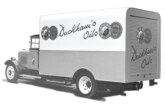Having been swept along like the rest of the nation this summer, it would be remiss of me not to congratulate the England football team for their recent World Cup heroics.
While there were many ingredients that helped the team outperform the ‘Golden Generation’ before them, it was arguably the attention to detail of the coaches that paid the most dividends. For instance, Southgate and various members of his coaching staff are reported to have made a number of visits across the pond in recent years, with a view to studying and learning from the set piece tactics that are so renowned in the NFL and NBA. Elements from these trans-Atlantic trips can be seen in some of England’s best moments in the tournament, and the team looked a constant threat from dead ball situations in the opponent’s half, so Southgate’s forensic approach clearly paid off.
But how can such dedication to detail and analysis be replicated by workshop owners and fleet managers? While many would believe their operations are streamlined, there is always more that can be done.
Take, for example, the role of IT in a workshop’s practices. Paper processes have been the norm for decades, with hundreds of thousands of documents, log books, MOT certificates and more being taken, filed, archived – and, in all likelihood, eventually lost. Yet there has been a shift in recent years, made possible by a variety of software platforms and improvements in technologies. Just as telematics developments are streamlining driver efficiencies and vehicle diagnostics, workshop management systems are transforming the in-house processes, too.
Everyday operations can now be logged and updated almost instantly, vastly reducing the amount of time spent on paperwork for technicians. For managers and owners, there is the ability to see a real-time log of the workshop, meaning they know exactly where their vehicles, or customers’ vehicles, are in the chain of maintenance and repair.
Much like how England’s coaches analysed the trends in penalties, and previous reasons for failure, workshops can also measure the patterns of prior processes. After all, self-reflection is vital to any business’ success. Have there been any gaps in recent schedules? Why do certain repairs/vehicles result in longer downtime? A fully integrated workshop management system should help to make this question and answer process far more efficient, providing the opportunity to better understand any trends that may appear.
While the introduction of software can sometimes seem like a big investment, the resulting improvements that can be made should outweigh this, and by some distance. Even for those less savvy with technology, most software options are designed to be easy to use, with plentiful support available to back up the implementation. Automatic reporting via mobile devices saves time on repair processes, while fleets can generate compliance documentation, which links directly to the Earned Recognition scheme, for example.
Much like perfecting set piece tactics, introducing a fully integrated IT system is just one way of doing this, but it might be the key to unlocking the next set of goals for your business.









